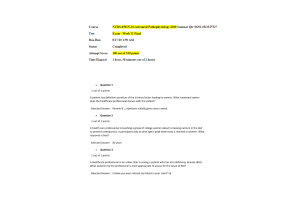NURS 6501 Week 10 Assignment; Case Study Analysis
- $20.00
Content Preview
Infertility in women and men can be caused directly or indirectly by sexually transmitted illnesses. When STDs go untreated, infections can move up the reproductive system, causing damage, scarring, and inflammation in the woman's uterus, ovaries, and fallopian tubes, resulting in infertility. Pelvic inflammatory disease (PID) and damage to the fallopian tubes are the two most common causes of STD-related infertility.
STDs or sexually transmitted diseases are very common all over the
world and millions of new infections occur every year. The disease
passes from one person to another through vaginally, oral, and anal sex.
PID or pelvic inflammatory disease is a serious complication of two of
the most common STDs which are chlamydia and gonorrhea. PID may
present with a variety of clinical signs and symptoms that range from
unnoticeable or subtle and mild to severe. Pattern recognition of STD
pathogens, by receptors, expressed either on the cell surface or inside
the cell which triggers inflammation at the mucosa barrier. PID is
caused by the colonization of the endocervix by microorganisms which
then ascend to the upper parts of the reproductive system.
Inflammation can be at any point along the continuum.
A prostate infection (prostatitis) occurs when the prostate and the surrounding area become inflamed. The prostate is about the size of a walnut, and it is located between the bladder and the base of the penis. The tube that moves urine from the bladder to the penis or urethra runs through the center of the prostate. The urethra also moves semen from the sex glands to the penis. Several types of infections can affect the prostate. Some men with prostatitis experience no symptoms at all, while others report many, including intense pain……..Continue






